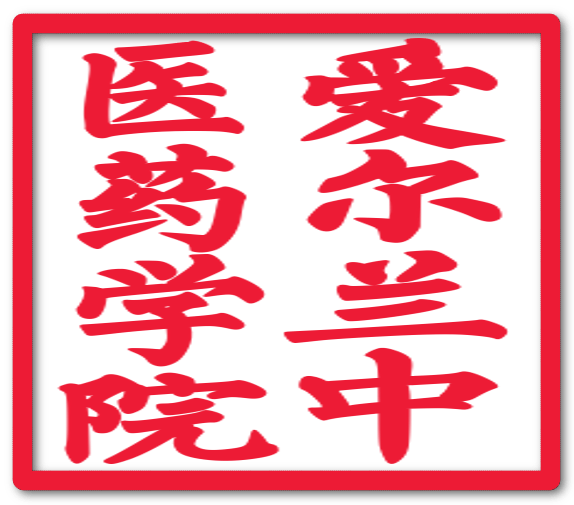
WELCOME
TO THE IRISH COLLEGE OF TCM
A lecture room waiting for our students to arrive.
As we kick off another exciting college year, we warmly welcome both new and returning students to the Irish College of Traditional Chinese Medicine. This new academic year brings fresh opportunities, challenges, and the chance to grow both academically and personally. Whether you’re joining the ICTCM for the first time or returning after the summer break, this is a time to embrace new beginnings.
For new students, it’s an occasion of exploration and adjustment. You’ll be navigating the academic world of college life. This is your chance to build lasting connections and shape your future in the world of TCM.
For returning students, welcome back! You’ve already shown resilience and dedication in your college journey, and now it’s time to continue pushing forward. Whether you’re approaching graduation or entering the next phase of your studies, this year brings new demands and possibilities to deepen your skills and knowledge.
We’re excited to see what you will achieve and how you will contribute to college life. Welcome to the new year, and best of luck from all at the Irish College of Traditional Chinese Medicine!
Applications are now closed for this year’s Acupuncture TCM Lic.TCM course. Applications for October 2025 will open in February.
Why the Irish College of Traditional Chinese Medicine was set up
Why the Irish College of Traditional Chinese Medicine was set up
When Prof Tom Shanahan first introduced Acupuncture Training in Ireland in the early 1980s, very few people had heard of Acupuncture, TCM or Chinese Medicine. The Irish College of Traditional Chinese Medicine (ICTCM) was set up in 1983 to help satisfy the growing demand for safe alternative healthcare. It was the first college providing Acupuncture Training in Ireland and is devoted to the teaching of Chinese medicine, according to the Classical Traditions of TCM, giving students a theoretically-secure base for establishing sound clinical practice of Acupuncture and TCM.
Acupuncture and TCM are now at the forefront of alternative approaches to health and illness, focusing as they do, not only on treating and curing current illness but also on disease prevention and on health enhancement.
As more people are interested in finding a medical system that is natural, holistic and, in the hands of a well-trained and fully qualified Acupuncturist or TCM practitioner, safe, more students are seeking to join our College in Dublin to complete Acupuncture Training in Ireland.
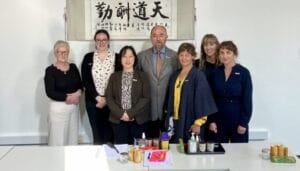
Acupuncture Training in Ireland
Clinical trainees and Staff 2024
The professional Acupuncture and TCM body, The Professional Register of Traditional Chinese Medicine, provides further information about qualified practitioners on its website.
The ICTCM’s Mission Statement
Our mission is to enhance the reputation and spread of Traditional Chinese Medicine (TCM). To this end we provide comprehensive theoretical and practical professional Acupuncture training in Ireland, during which Acupuncture is taught as part of Traditional Chinese Medicine. In doing this, we are helping to provide the public with fully trained, fully qualified and fully insured Acupuncturists in whom they can have complete confidence.
As our next 2024 Licentiate in Traditional Chinese Medicine Acupuncture training Course begins on the first weekend in October, we will be closing applications for this year’s course on 20th September. There is still time to make a late application, and you can find the prospectus pack here.
What is Traditional Chinese Medicine Acupuncture?

Traditional Chinese Medicine Acupuncture Treatment
Traditional Chinese Medicine Acupuncture is part of TCM which is a rich and sophisticated system of health and wellness that has been practiced for thousands of years. Acupuncture stands out as one of the most widely recognised and practiced treatment methods of TCM. Rooted in a holistic understanding of the human body and its interconnectedness with the environment, it offers a unique approach to healing and wellness.
The Philosophy behind Acupuncture
At the heart of TCM is the concept of Qi (pronounced “chi”). Qi flows through the body along pathways. According to TCM, illness and pain occur when the flow of Qi is disrupted or imbalanced. Acupuncture seeks to restore the harmonious flow of Qi by stimulating specific points on the body’s surface, known as acupuncture points.
By inserting thin needles into the Acupuncture points, Acupuncturists aim to unblock and balance the flow of Qi, thereby promoting natural healing and overall well-being.
The practice of Acupuncture
Acupuncture involves the insertion of extremely fine, pre-sterilised, stainless steel needles at predetermined acupuncture points on the body surface to restore internal health. Many of the most commonly selected points are on the arms and legs.
TCM Acupuncture can be used alone or combined with other treatment methods of TCM such as Moxibustion, Medical Qigong or Herbal Medicine.
Special features
One of the most outstanding features of TCM is that treatments can be tailored to fit the individual. Treatments are always unique, even if the medical conditions seem to be similar.
TCM is compatible with other systems of medicine, including Western Medicine and is frequently used alongside it.
In the hands of a fully qualified professional practitioner the use of acupuncture is entirely safe and free from harmful side effects.
If Traditional Chinese Medicine Acupuncture is something that interests you, you can learn more about the three year part time Professional Acupuncture Training programme. The Irish College of TCM has been running this course for over 40 years and starts a new group each year. Applications are still being taken for this year’s early October start date.
Becoming an Acupuncturist at the ICTCM
One of the things I most enjoyed when becoming an Acupuncturist at the ICTCM was the niche knowledge of TCM philosophy that I acquired. Another was the insight into all of the Acupuncture points especially the names and the Chinese characters. Also I really appreciated the help and guidance when setting up my own clinic in the third year of the Acupuncture training.
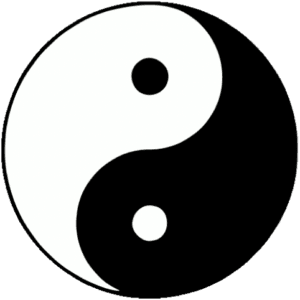
Taiji the Great Polarity
Niche knowledge – At the heart of TCM Acupuncture Training lies the richness of TCM philosophy, with its principles of Yin and Yang, Qi, and the Five Vital Substances. Delving into these ancient concepts, I found myself immersed in a world where the body is viewed as a dynamic ecosystem, interconnected and in constant flux. A whole new view of the world and nature began to form. The insight into how to live in harmony with it and to learn its way was something I found hugely fascinating and very beneficial in terms of personal growth. This knowledge is not yet widely known and in fact is becoming more difficult to find in modern times. I felt a deep appreciation to have found it and be given the opportunity to learn it.
Acupuncture points and their names and characters – The learning of the points and their precise location was challenging and indeed very demanding. However, what interested me was the names given to, and the characters used for, each individual point. These painted a picture of what they did within the body. The characters that are used in the Chinese language give clues to what the words mean or represent, which makes it difficult for the meaning to get lost in translation as time passes, as often happens in other languages.
Support in Setting up my own Clinic – I also found the help and guidance offered by experience staff in the clinical year, prior to setting up my own clinic, was very beneficial. This was something I had little knowledge about and greatly relied on the expertise of the clinical supervisors who guided me through the whole process. Getting to set up my clinic during the clinical year meant I had access to the support and help offered by the college as I learned the ins and outs of running my own business.
If you are interested in becoming an Acupuncturist at the ICTCM, applications are still being taken for the 2024 start in early October. Application forms can be found as part of the prospectus pack.
Introduction to the study of TCM and Acupucture
Introduction to the study of TCM and Acupuncture
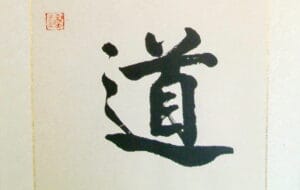
DAO – the Path every person follows in life.
In late September or early October, at the start of every Academic year, the College Founder and Director Tom Shanahan welcomes new students to the Irish College of Traditional Chinese Medicine (ICTCM). His introduction places the study of TCM and Acupuncture, as taught at the college, within the philosophical framework of Daoism.
All medical systems have their use and value; each satisfies certain needs. Every system is only as good as its practitioner. As the practitioner is the most powerful medicine in the surgery, it matters hugely who you are and not just what you do. Thus, the study of Traditional Chinese medicine (TCM) has to be not solely a study of medicine but also a way towards personal development.
Acupuncture is part of TCM. TCM is a supremely preventative medicine with a sophisticated theoretical structure. Essentially it is a simple and profound system, not based upon man-made laws but upon laws of nature, the natural laws of the universe, or what the Chinese refer to as the Dao – the Way. 道
The Dao predates human civilization and transcends all boundaries of space and time, race and culture, since it is the universal and enduring Way of nature. It is the primal power that forges all phenomena in the universe, from the infinite to the infinitesimal. Invisible yet ever present it permeates the world with the very breath of life, and those who learn how to harmonize themselves with the Dào may harness that power to enhance and prolong health and life itself.
This Way is not simply a philosophy of life but rather an entire way of life based upon the most fundamental of laws. These laws do not change and will never become out of date. They are permanent and immutable.
The whole article can be viewed here.
Acupuncture Course at the ICTCM – How to apply
How to apply for the Acupuncture Course at the ICTCM
The Application procedures are as follows:

Application pack for the Acupuncture Course at the ICTCM
- Obtain a full Prospectus pack, Acupuncture Professional Training (Lic.TCM) Prospectus pack online as a PDF file
- Read the prospectus pack carefully.
- Print (if necessary), fill in and sign the Application form (see notes below) and then
- Scan it and send it as an email attachment to the Admissions Officer. The email address to send it to is on the Prospectus letter.
- Include an email or letter explaining why you wish to apply.
- Include a passport sized photograph of yourself.
You must provide
- As much detail as possible about your reasons for wishing to apply.
- Honest and inclusive information about yourself including your educational, medical and occupational background.
- The name, postal address, email address and telephone number of 2 people who are willing to provide a reference for you. They should know you well but must not be close family members. We will ask them to vouch for your character and academic ability, and give their view of your suitability to work with people in a caring profession.
Here you can go directly to the Application form.
Selection Procedures
We have been successfully running this course for over 40 years and accept serious applicants who aspire to become Acupuncturists using Acupuncture TCM to treat clients with medical conditions,
We take up references for all applicants. Suitable applicants are then interviewed by a senior member of staff, via Zoom, and the whole process usually takes between 30 and 45 minutes.
This gives you time to ask questions and make sure that the course is suitable for you.
If you would like to find out about some of our previous students take a look at our Graduates page.
Why retrain as a TCM Acupuncturist?
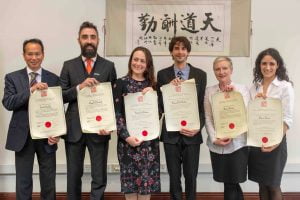
Are you thinking of retraining or looking for something more from your career? Have you considered TCM Acupuncture? Below are just a few reasons why it is a good time to get into Traditional Chinese Medicine as a career and retrain as a TCM Acupuncturist.
- Growing demand for Traditional Alternative Medicine. The use of Traditional medicine is increasing every year with Acupuncture being the most popular choice according to the World Health Organisation.
“One hundred seventy countries reported on the use of traditional medicine, with acupuncture being the most common form of practice in 113 countries” World Health Organisation (09/08/2023) “Traditional Medicine” WHO. https://www.who.int/news-room/questions-and-answers/item/traditional-medicine)
Many are using TCM Acupuncture to alleviate side effects of medications with great success while others are choosing to use TCM as their only form of medicine with its benefits of being holistic, natural and safe.
- Low set up costs. Upon qualifying as a TCM practitioner it is relatively inexpensive to set up your own clinic. The costs are minimal when compared to other self employed areas. Clinics can be set up at home.
- Job satisfaction. Many graduates find the best part of being a TCM Practitioner is the job satisfaction. The rewards of helping others and sharing an alternative form of medicine is for many, the reason for doing it in the first place. Practitioners frequently report that after a day’s work in the clinic they are not tired but in fact, feel energised. They also tend to be in good health themselves.
- Lifestyle to suit your needs. Once you are a qualified TCM Practitioner, it is up to you, as self employed, to choose your own work hours. You are your own boss. You can fit your clinic around your home life or around other employment, at times that suit you.
- Be part of the TCM community.As well as job satisfaction and being your own boss, you will also be part of a movement toward offering this holistic, ancient medical system to those who need it. An effective alternative treatment option which is in increasing demand. People need alternatives when they run out of hope. TCM is an invaluable option to be able to offer in such situations.
If you would like to learn more about training in TCM Acupuncture you can view the ICTCM website here. It has detailed information on TCM Acupuncture as well as on our Professional Acupuncture Training programme which runs each year from early October. We are now taking applications for this year. If you are interested in applying please read the prospectus pack which includes an application form. Early application is advised as places are limited.
Career prospects of Acupuncture Training at the ICTCM
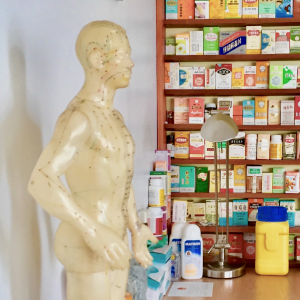
A common question asked by potential students is “What are the career prospects of TCM Acupuncture training at the ICTCM?”
The Lic. TCM Acupuncture training course is a part-time course which is equivalent to a degree level standard. It takes two and a half years to complete. Many of the students at the ICTCM maintain their full time employment while undertaking this course. This makes it a popular choice with those wishing for a career change but need to remain in full-time employment while retraining.The TCM Acupuncture Training course is specifically designed to provide graduates with the skills, knowledge and confidence to set up a TCM Clinic immediately after graduation and over time develop a thriving professional practice in Acupuncture and TCM.
So, what are the career prospects after TCM Acupuncture Training?
On completion of the Licentiate, students are qualified to practise Acupuncture within the field of TCM as a member of a professional organisation in Ireland and/or the UK.
Graduates can –
- Practise from home on either a full or part-time basis
- Work in a joint practice with other healthcare providers or GP’s
- Work in their own private clinic or a hospital setting.
For most graduates, Acupuncture and TCM eventually becomes their only profession and enables them to be financially successful in a rewarding career.
Others pursue further training at postgraduate level in other branches of TCM, for example Chinese Herbal Medicine or Medical Qigong. Graduates are eligible to apply for such postgraduate courses available at the ICTCM.
To learn more about career prospects in TCM Acupuncture you can visit the ICTCM website where there is more detailed information about this and other aspects of the course including the course structure and schedule. If you are thinking of a change in career and are interested in TCM Acupuncture we look forward to hearing from you. Applications are now being taken for the October 2024 start date.
Celebrations – Chinese New Year of the Wood Dragon

Celebrations and Good Wishes for the Chinese New Year. The ICTCM is very happy to send good wishes for the Year of the Wood Dragon to all our students, graduates, staff and friends around the world.
Did you know that the Chinese Calendar is based on the Lunar Year and the New Year occurs on a different date each year. This year is the year of the Wood Dragon. Each year is linked to one of twelve animal signs that make up the Chinese zodiac. The dragon represents the 5th of these signs. Each animal represents specific characters and the Dragon represents among other things, strength and luck.
Other animals that make up the 12 signs include the Snake, Horse, Goat, Rooster, Dog, Tiger, Rat, Monkey, Pig, Ox and Rabbit.
This Chinese New Year started this year on February 10th, although celebrations can last up to two weeks. The celebration has a history which is over 3000 years old and is said to mark the beginning of Spring. It is celebrated by family get-togethers, decorating with the colour red which is the traditional colour used during Chinese New Year. Activities include savouring traditional foods, sending red envelopes, dragon dances and lantern festivals.
China has a rich culture steeped in ancient wisdom, part of which includes its Medicine. It has been used successfully for thousands of years. Knowledge that pre-dates modern scientific methods are still being used by over 40 % of the global population as their primary form of medicine.
If you would like to learn more about Traditional Chinese Medicine you can find detailed information on the Irish College of TCM’s website.
Happy New Year of the Wood Dragon from all at the ICTCM in Dublin, Ireland.
Frequently asked questions 1 – Will I be a suitable applicant for TCM Acupuncture Training?
As the ICTCM is now accepting applications for the next three year, part time, TCM Acupuncture training course we are providing answers here to some of the most commonly asked questions.
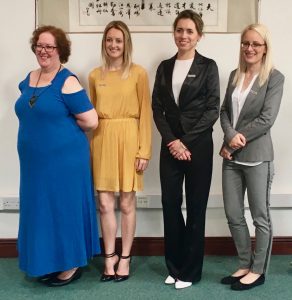
Some TCM Acupuncture Graduates
“What qualifications do I need to be a suitable TCM Acupuncture Student at the Irish College of Traditional Chinese Medicine(ICTCM)?“
You do not need to have prior qualifications in either TCM or Western Medicine. You must be able to show us that you have the capacity (not just the desire) to undertake an intensive course of part-time study over a three year period.Prior study on intensive or demanding courses will be an advantage, because you will be prepared and know a little of what to expect, but this is not a requirement.
“What personal qualities do I need?”
You need to be intelligent, not afraid of hard work and willing to work in a small group with other adults who have the same hopes and expectations as yourself. The course sets high standards and we accept students who are prepared to put in the necessary commitment to be successful in the academic, practical and interpersonal aspects of the course. It helps to be mature and well motivated and being kind and helpful to others are qualities that will help you to be a better practitioner.
You will be training to be a professional practitioner of TCM Acupuncture so many different skills need to be developed.
You can find out more about our Students and Graduates and the specific entry requirements via these links.

